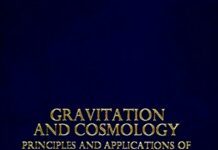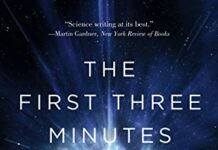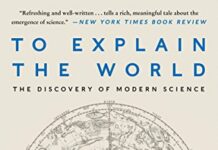
Ebook Info
- Published: 2018
- Number of pages: 240 pages
- Format: PDF
- File Size: 6.25 MB
- Authors: Steven Weinberg
Description
“The phrase ‘public intellectual’ is much bandied about. Just a few real heavyweights in the world merit the title, and Steven Weinberg is preeminent among them.”—Richard Dawkins“Weinberg has a knack for capturing a complex concept in a succinct, unforgettable image… One of the smartest and most diligent scientists around.”—NatureIn this wise and wide-ranging meditation, one of the most captivating science communicators of our time challenges us to reconsider the entanglement of science and society. From the cosmological to the personal, from astronomy and quantum physics to the folly of manned spaceflight and the rewards of getting things wrong, Steven Weinberg shares his views on the workings of the universe and our aspirations and limitations. Third Thoughts aims to provoke and inform and never loses sight of the human dimension of scientific discovery.“One of the 20th century’s greatest physicists…shares his strongly-held opinions on everything from the Higgs boson to the state of theoretical physics and the problems of science and society.”—Forbes“This book should be read not only for its insightful and illuminating explanations of a wide range of physical phenomena but also for the opportunity it affords to follow the wanderings of a brilliant mind through topics ranging from high-energy physics and the makeup of the cosmos to poetry, and from the history and philosophy of science to the dangers of economic inequality… [A] captivating book.”—Mario Livio, Science
User’s Reviews
Reviews from Amazon users which were colected at the time this book was published on the website:
⭐Some parallels can be seen between “Third Thoughts” and “Reason and the Search for Knowledge” (RSK) by Dudley Shapere: “Not that we know in advance what kinds of understanding is possible and satisfying. Learning is part of the work of science.” (p. 64), and in RSK by DS: “The aim of science, then, cannot be restricted any way in advance of the investigation of nature.” (p. 399); Steven Weinberg: that from the history of science we understand better what it means to be “… learning how to learn about the world …” and “Much of the history of science has been a matter of learning what sort of questions should and should not be asked.” (p. 64); and in RSK by DS: “Science thus develops through a give-and-take interaction between the methods with which it approaches nature and what it learns about nature … in all these aspects, science is subject to change. And it has learned to make those changes, wherever possible, in the light of reasons — reasons which, for us, consist of observations of nature.” …. “… learning through observation, we gradually forge concepts which reflect what we have found to be the case, or at least believe to be the case on the basis of the best reasons we have available; and then we seek to learn further about nature, and perhaps we will be led to further revision of the concepts we have forged, and so on.” (p. xxxiii).The author has been at the forefront of modern science, explored physics, cosmology, and spoke on climate and security issues (“Lake Views”, documentary film “Nobelity”); acted as a public intellectual and made this knowledge accessible (“Facing Up: Science and its Cultural Adversaries”); and has studied the long, prestigious, and frequently arduous history of science (“To Explain the World”).
⭐Steven Weinberg’s essays in this book have interesting facets largely because he has thought deeply about some of the topics. The essays are, for the most part, put together from prior publications. They are all short and readable. He is arguably one of the giants of theoretical physics, whose great work was mostly done in the turbulent, highly creative period in the U.S. during the 1960s and 1970s. His general comments about the physics that interested him, and the elements of the theory he helped create are especially interesting, but it might take some prior education in physics to appreciate some of what he writes (although perhaps not, as he does supply explanatory footnotes). I recommend reading these essays. He and a few other great physicists of the times of his creative work (like Kenneth Wilson) were the “favored of the gods.” They built the citadel of physics and astronomy of today.
⭐As all of Weinberg’s writing this one is entertaining, informative, and concise. This is the third in a loosely related series but the reading order is not important. The selections here are a bit on the technical side so it will be necessary to spend some thinking time if you want to understand them completely. This book is highly recommended for those with more than a passing interest in the current thought in quantum science.
⭐Fast, good condition!
⭐Steven Weinberg is one of the few physicists who can make physical reductionism aesthetically pleasing. Having read most of Weinberg’s work, however, this book is largely a recapitulation of his previous writings (some essays are directly taken from his other essay collection). Nothing particularly novel in this collection, but a good starting point for anyone new to Weinberg.
⭐My favorite essay was on Foundations of quantum mechanics. There are also a couple of essays on the Standard Model. And one essay on Symmetry.
⭐Although there are some thought provoking essays, much of the collection consists of prior presentations the author has made. It therefore has the feel of more of a convenient means of compiling a book to generate revenue. Not an attractive proposition for a scientist of his stature.
⭐Weinberg has done a good job with this book, as expected.
⭐This is an amusing book consisting of the authors articles for the general public. It includes some on physics and others general interest.
⭐Steven Weinberg ist Professor für Physik an der Universität von Texas in Austin, er erhielt 1979 gemeinsam mit Abdus Salam and Sheldon Glashow den Nobelpreis für seine Beiträge zu einer vereinheitlichten Theorie der schwachen und elektromagnetischen Wechselwirkung; von ihm stammt u.a. eine dreibändige Monographie zur Quantenfeldtheorie, darüber hinaus engagiert sich Weinberg für die Popularisierung der modernen Physik und er Wissenschaft im allgemeinen. Von ihm stammen eine ganze Reihe exzellenter poulärer Bücher, darunter ‘The First Three Minutes’, ‘The Discovery of Subatomic Particles’ und ‘Dream of a Final Theory’.Das vorliegende Buch ist der dritte Band einer Sammlung von Essays, die sich an ein allgemeines Publikum wenden und Themen der modernen Physik, Kosmologie und deren Geschichte behandeln, aber auch Fragen von persönlichen und öffentlichen Interesse. Die meisten dieser Essays wurden in ‘New York Review of Books’, Tageszeitungen oder anderen Periodika veröffentlicht – sie werden jeweils mit einem Kommentar des Autor eingeleitet, in dem der Anlass und Kontext des Artikels erläutert wird.Ein Reihe von Beiträgen beschäftigen sich mit der herausragenden Rolle von Symmetrien in der Theorie der Elementartteilchen, mit der Bedeutung des Higgs Bosons für das Standard Modell der Teilchenphysik, sowie den Begebenheiten rund um seine Entdeckung 2012 am CERN. Die Texte sind geprägt von der wissenschaftlichen Brillianz des Autor, die in einzigartiger Weise mit der Fähigkeit gepaart ist, komplizierte Sachverhalten und Zusammenhänge allgemein verständlich zu formulieren, ohne dabei zu allzu vereinfachenden Erklärungen Zuflucht zu nehmen. Ein Paradebeispiel dafür ist ‘The Trouble with Quantum Mechanics’, ein Artikel zur Interpretation der Quantenmechanik. Während die Quantenmechanik seit über neunzig Jahren die Theorie ist, die die oft kontraintuitiven atomaren und subatomaren Phänomene präzise beschreibt, und kein Zweifel darüber besteht, wie diese diese Theorie anzuwenden ist, herrscht nach wie vor keine Einigkeit über ihre Interpretation. Die Unzufriedenheit mit den gängigen Deutungen der Quantenmechanik, trieb Weinberg wieder um, als 2015 er seine ‘Lectures on Quantum Mechanics’ für die zweite Edition überarbeitete. Aber kaum jemand hat die Probleme so präzise in einer Frage zusammengefasst: ‘Woher kommen die Wahrscheinlichkeiten in der Quantenmechanik?’ – denn aus der Schrödingergleichung kann man ja die Bornschen Regeln nicht ableiten. Weinberg teilt die Interpretationen in zwei Klassen, die instrumentalistischen und die realistischen, je nachdem welche Bedeutung sie den Zustandsvektoren beimessen, er identifiziert aber Schwächen bei beiden – um im Anschluss mögliche Erweiterungen der Theorie in Betracht zu ziehen, die das Problem der Wahrscheinlichkeiten intrinsisch lösen könnten.2015 erschien auch ‘To Explain the World’, darin schildert Weinberg die Geschichte der modernen Wissenschaften und insbesondere der Physik, beginnend mit ihren Anfängen im antiken Griechenland; er baut dabei auf seinen Vorlesungen zur Geschichte der Astronomie und Physik an der Universität Austin, Texas, auf. Im Vorwort bekennt er, dass er sich damit auf das von Historikern gemiedene Terrain, der Beurteilung der Vergangenheit gemäß der Standards der Gegenwart, begibt – eine Rezension des Buches im Wall Street Journal trug deswegen nicht ganz unerwartet den Titel ‘The Whig Interpretation of Science’. In zwei Essays erläutert und verteidigt Weinberg seine Ansichten zur Wissenschaftsgeschichte.Steven Weinberg ist nicht nur ein Wissenschaftler von Weltrang, er engagiert sich auch aktiv in der Wissenschaftspolitik, in den 1980iger Jahren war er einer der prominentesten Befürworter für den Bau des amerikanischen Teilchenbeschleunigers SSC, des Bedeutung für den Fortschritt der Physik er in ‘Dream of a Final Theory’ zu erläutern versuchte. Mit ‘The Crisis of Big Science’ greift er dieses Thema wieder auf, zeigt auf wie nach dem Aus des SSC 1993 der europäische Beschleuniger LHC – mit zehn Jahren Verspätung – dessen Aufgaben übernommen hat, und welchen Widerständen sich heutige wissenschaftliche Großprojekte in Physik und Astronomie, wie der Satelliten basierte Gravitationswellen Detektor LISA, gegenüber sehen.Aristoteles verfasste seine Schriften noch für alle gebildeten Griechen, die zunehmende Mathematisierung der exakten Wissenschaften verhindert heute oft den direkten Zugang zu wissenschaftlichen Publikationen für einen großer Teil der Leser, erläutert Weinberg in ‘Writing about Science’ — ein Artikel, um den der Autor vom Guardian anlässlich des Erscheinen seines schon erwähnten Buches ‘To Explain …’ in England, gebeten wurde. Darin erläutert er seine Methode, eigentlich zwei Geschichten zu schreiben, die allgemein gehaltene im Haupttext, während Anhang und zahlreiche Anmerkungen Details für den interessierten Leser nachliefern. Der Autor bekennt auch, dass ein Anziehungspunkt beim Schreiben für die Allgemeinheit für einen ‘working scientist’ darin besteht, sich in Kontroversen engagieren zu können; einer Möglichkeit, der sich schon Galilei und Darwin bedienten.Das Buch bietet einen faszinierenden Querschnitt aus dem Schaffen, Wirken und Leben von Steven Weinberg, den Richard Dawkins einen wenigen ‘public intellectuals’ nennt, der diesen Titel wirklich verdient.
⭐
⭐Usually I’m one of those who caution readers: Don’t accept the authority of a scientist on fields other than his own.In the case of Steven Weinberg, just throw caution to the winds. This is a great collection of essays on both the cutting edge of physics and the common sense needed in education and science policies. No fourth thoughts needed.
⭐Para aquellos que conocen a Steven Weinberg no hay necesidad de aludir a sus ensayos y el valor de los mismos. Pero en estos días de editoriales avaras que hacen ediciones corrientes de libros técnicos y no técnicos muy buenos en contenido hay que aplaudir las buenas ediciones y el esfuerzo por mantener el estándar.
⭐
⭐Brilant Thoughts. Deep but written in simple way and in beautiful style.I have bought 25 copies of this book to give them to my friends.
Keywords
Free Download Third Thoughts: The Universe We Still Don’t Know in PDF format
Third Thoughts: The Universe We Still Don’t Know PDF Free Download
Download Third Thoughts: The Universe We Still Don’t Know 2018 PDF Free
Third Thoughts: The Universe We Still Don’t Know 2018 PDF Free Download
Download Third Thoughts: The Universe We Still Don’t Know PDF
Free Download Ebook Third Thoughts: The Universe We Still Don’t Know



